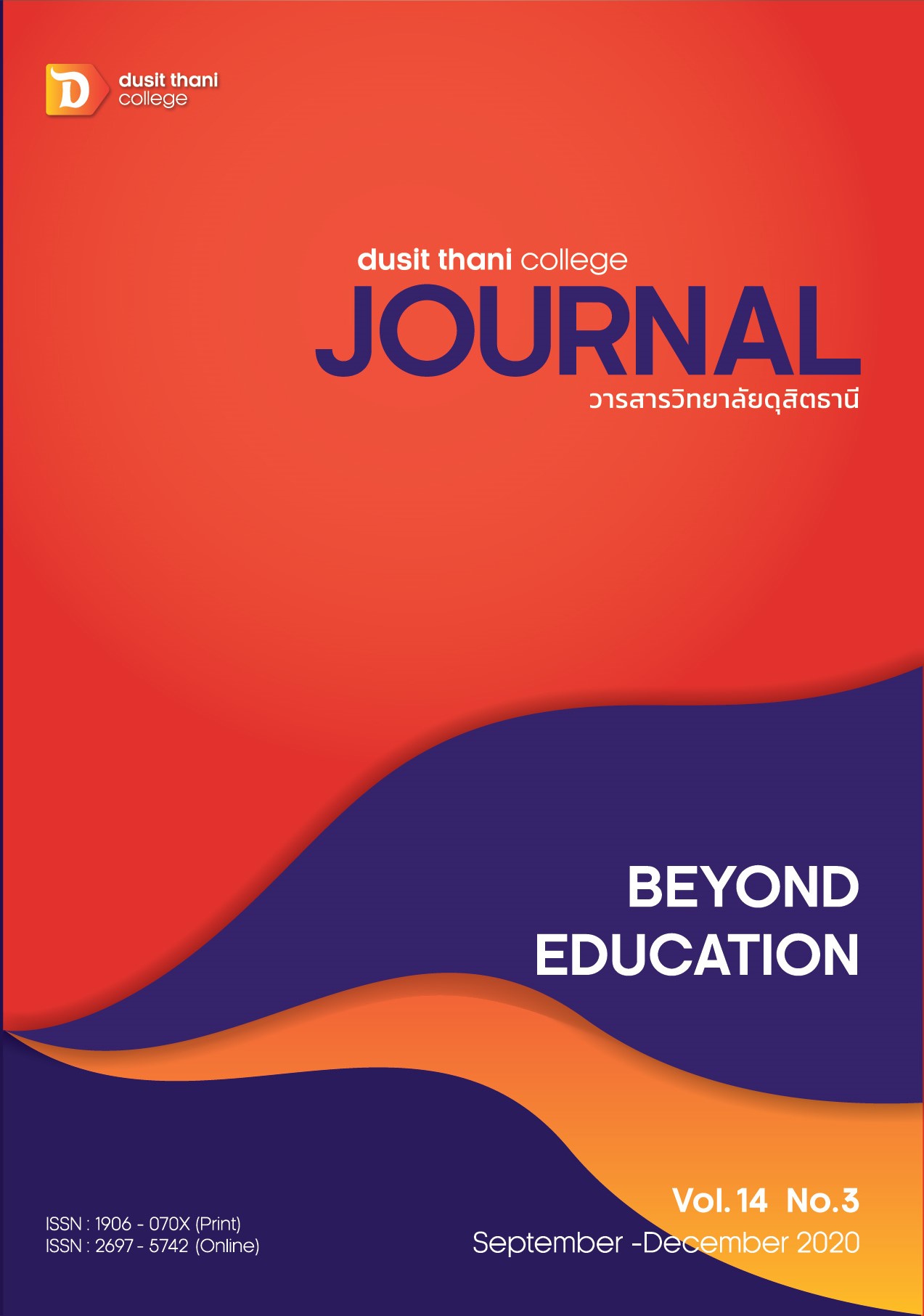Nutritional Food Consumption Behavior of Elderly in Chonburi Province
Main Article Content
Abstract
This research aimed to study the nutritional consumption behavior, level of the nutritional consumption behavior, and the authentic assessment of the nutritional consumption behavior of elderly in Chonburi province. The data was collected from 120 participants aged 60 years old and above, and 10 participants were observed and interviewed for qualitative study. The research instruments used were questionnaire and observation forms. The data was analyzed in frequency, percentage, standard deviation, and content analysis.
According to the study, findings included that: Most participants were female with a mean height of 158.88 cm and a mean weight of 64.16 kg. They had an average income of 10,000 baht/month and had graduated from secondary school level. Participants had good nutritional food consumption behavior and the authentic assessment of the nutritional consumption behavior details were as follows: Firstly, for ingredients preparation, they had their own backyard garden, purchased meat from mobile food trucks and their family members encouraged them to buy ingredients from a department store. Secondly, most of them carried out home cooking and seldom bought ready-to-eat food from fresh market as they had concerns regarding sanitation and food safety and have genuine concerns regarding personal health and congenital disease. The main dishes consumed by elderly consisted of simmered meat and vegetables with a mild taste, and finally most elderly carry out daily cooking activities consisting of 3 meals per day, refrigerating any surplus food, and reheating later.
Article Details
Article Screening Policy
- All research and academic articles to be published must be considered and screened by three peer reviews in the relevant field / article.
- All articles, texts, illustrations and tables published in the journal are the personal opinions of the authors. Editors don't always have to agree. And no responsibility whatsoever is the sole responsibility of the author.
- The articles to be published must never be published. Where did you first publish? And not in the consideration of other journals If the audit found that there has been a duplicate publication It is the sole responsibility of the author.
- Any article that the reader sees as being plagiarized or impersonated without reference. Or mislead the work of the author Please let the journal editor know it will be your greatest blessing.
References
Chaitongkea, S. (2015). Factors affecting food consumption behaviors of adults in northeastern Thailand. Retrieved September 30, 2019. From https://www.tci-thaijo.org/index.php/researchjournal-lru/article/view/130075.
Chumkaew, K. & Rungsayatorn, S. (2014). Knowledge, Attitude, and Food Consumption Behavior of the Elderly in Songkhla Province. Kasetsart Journal (Soc. Sci), 35, 16–29.
De Pinho, L., Moura, P. H., Silveira, M. F., De Botelho, A. C., & Caldeira, A. P. (2013). Development and validity of a questionnaire to test the knowledge of primary care personnel regarding nutrition in obese adolescents. BMC Family Practice, 14(1), 102.
Department of Older Persons. (2020). Older statistics of Thailand. On 31 December, 2020. Retrieved May 29, 2020. From http://www.dop.go.th/th/know/side/1/1/275.
Drake, T., & Ogletree, R. J. (2018). Development of the health and weight attitudes scale. Journal of Nutrition Education and Behavior, 50, 506-510.
Eertmans, A., Baeyens, F., & Van den Bergh, O. (2001). Food likes and their relative importance in human eating behavior: Review and preliminary suggestions for health promotion. Journals of Health Education Research, 16(4), 443-456.
Kanjanawasee, S. et al. (2016). Selecting appropriate statistics for research (7th ed). Bangkok : chulalongkorn university printing house. (In Thai).
Kuanpradit, S. (2016). Dietary behavior of long-living elderly in Tambon Tha Phi Liang, Muang district, Suphan Buri province. Master of Home Economics, Major program Home Economics, Faculty of Home Economics Technology, Rajamangala University of Technology Phra Nakhon.
Maneerat, W., Laowongsa, J., Kunaan, K., Paisarn, S. & Leumteum, K. (2017). Food consumption behavior of the elderly: Case study of Mae Khaw Tom sub-distric, Muang distric, Chiang Rai province. Research and Development Institute Chiang Rai Rajaphat University, 11(3), 135-143.
Ministry of Public Health. (2019). Nutrition flag healthy eating for Thais. Retrieved September 30, 2019. From http://nutrition.anamai.moph.go.th/ ewt_news.php?nid=385.
Pirouznia, M. (2000). The correlation between nutrition knowledge and eating behavior in an American school: The role of ethnicity. Nutrition and Health, 14(2), 89-107.
Pruksa, S. (2018). Food consumption behaviors and nutrition status of the elderly in Na-o sub-district, Muang district, Loei province. Journal of the Office of DPC 7 Knon Kaen. 25(3), 67-76.
Ryan, P. (2009). Integrated theory of health behavior change: Background and intervention development. Clinical Nurse Specialist, 23(3), 161-172.
Sahaspho, S., & Thongkam, J. (2017). Principles of Nutrition. Bangkok: Chulalongkorn University press.
Stake, R, E. (2006). Multiple case study analysis. New York, NY; Guildford Press.
Thongsuk, T. (2019). Dietary behavior of the elderly on era 4.0. Journal of Humanities and Social Sciences, Rajapruk University, 5(3), 232-244.
Wardle, J., Parmenter, K., & Waller, J. (2000). Nutritional knowledge and food intake. Appetite, 34(3), 269-275.


